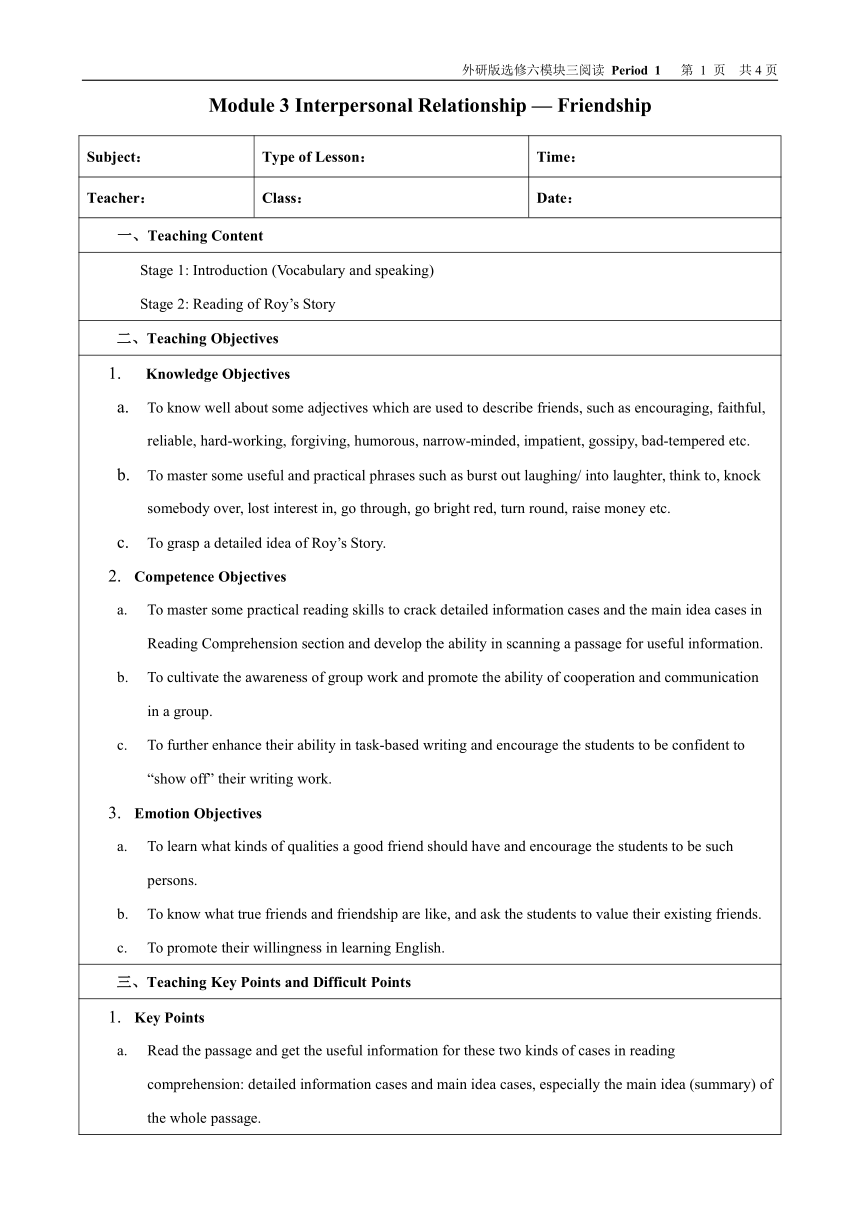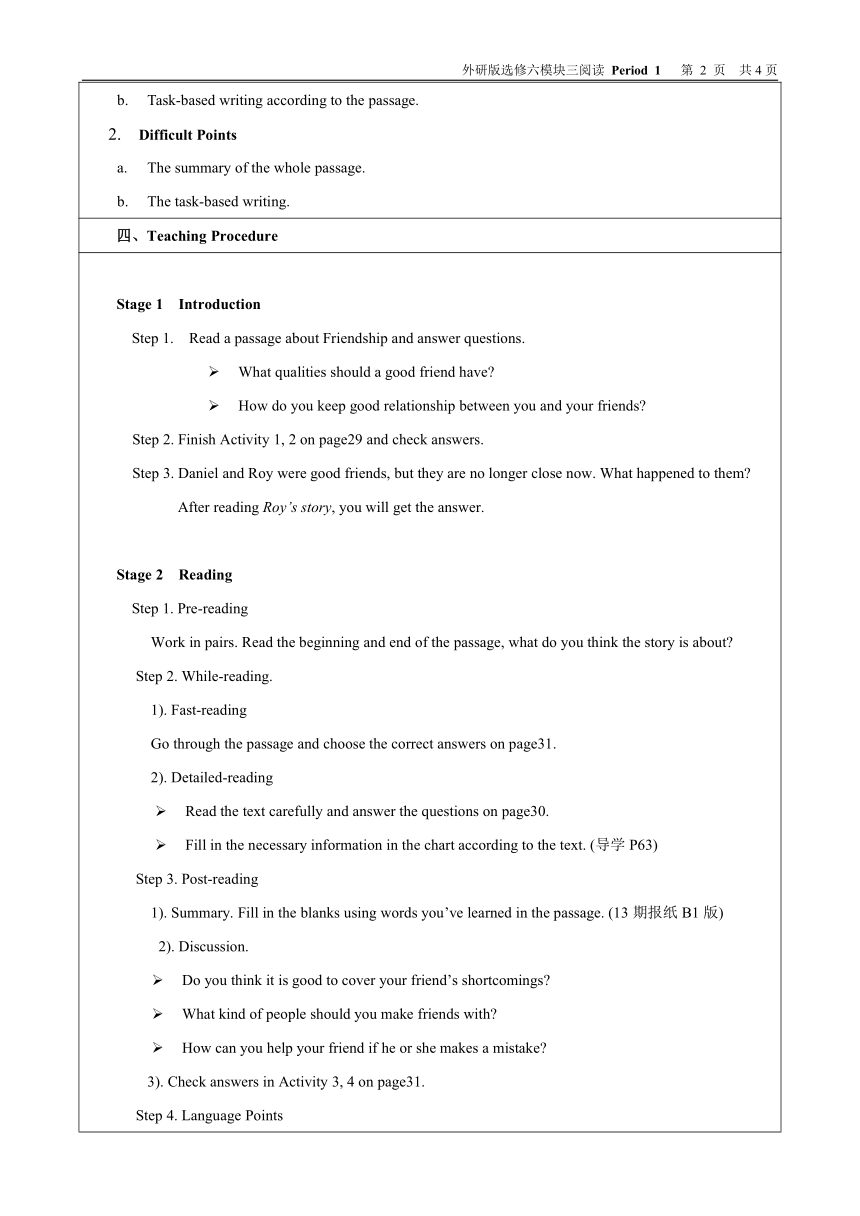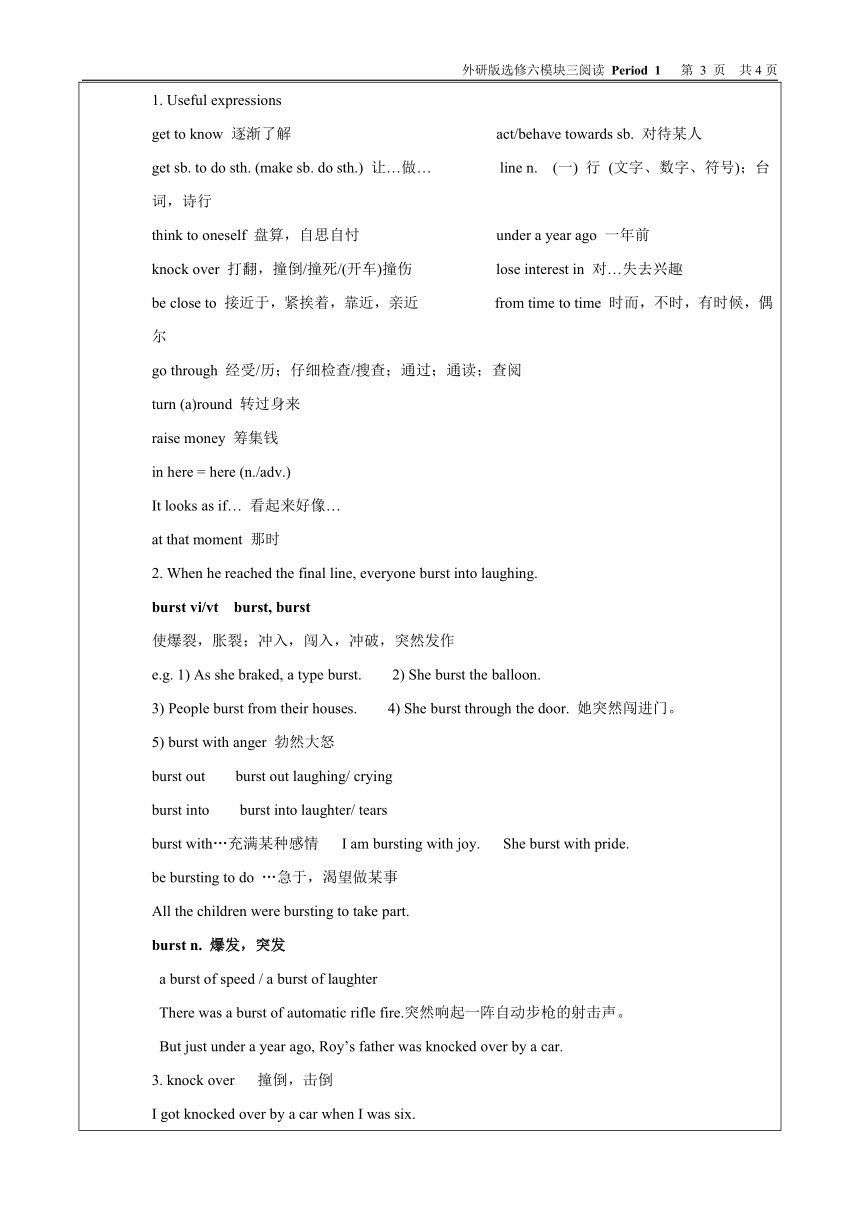外研版高中英语 选修六Module 3 Interpersonal Relationship — Friendship Reading 教案
文档属性
| 名称 | 外研版高中英语 选修六Module 3 Interpersonal Relationship — Friendship Reading 教案 |  | |
| 格式 | zip | ||
| 文件大小 | 75.5KB | ||
| 资源类型 | 教案 | ||
| 版本资源 | 外研版 | ||
| 科目 | 英语 | ||
| 更新时间 | 2021-04-07 08:56:09 | ||
图片预览



文档简介
外研版选修六模块三阅读
Period
1
第
4
页
共4页
Module
3
Interpersonal
Relationship
—
Friendship
Subject:
Type
of
Lesson:
Time:
Teacher:
Class:
Date:
一、Teaching
Content
Stage
1:
Introduction
(Vocabulary
and
speaking)
Stage
2:
Reading
of
Roy’s
Story
二、Teaching
Objectives
?
Knowledge
ObjectivesTo
know
well
about
some
adjectives
which
are
used
to
describe
friends,
such
as
encouraging,
faithful,
reliable,
hard-working,
forgiving,
humorous,
narrow-minded,
impatient,
gossipy,
bad-tempered
etc.To
master
some
useful
and
practical
phrases
such
as
burst
out
laughing/
into
laughter,
think
to,
knock
somebody
over,
lost
interest
in,
go
through,
go
bright
red,
turn
round,
raise
money
etc.To
grasp
a
detailed
idea
of
Roy’s
Story.Competence
ObjectivesTo
master
some
practical
reading
skills
to
crack
detailed
information
cases
and
the
main
idea
cases
in
Reading
Comprehension
section
and
develop
the
ability
in
scanning
a
passage
for
useful
information.To
cultivate
the
awareness
of
group
work
and
promote
the
ability
of
cooperation
and
communication
in
a
group.To
further
enhance
their
ability
in
task-based
writing
and
encourage
the
students
to
be
confident
to
“show
off”
their
writing
work.Emotion
ObjectivesTo
learn
what
kinds
of
qualities
a
good
friend
should
have
and
encourage
the
students
to
be
such
persons.To
know
what
true
friends
and
friendship
are
like,
and
ask
the
students
to
value
their
existing
friends.To
promote
their
willingness
in
learning
English.
三、Teaching
Key
Points
and
Difficult
Points
Key
PointsRead
the
passage
and
get
the
useful
information
for
these
two
kinds
of
cases
in
reading
comprehension:
detailed
information
cases
and
main
idea
cases,
especially
the
main
idea
(summary)
of
the
whole
passage.
Task-based
writing
according
to
the
passage.Difficult
PointsThe
summary
of
the
whole
passage.The
task-based
writing.
四、Teaching
Procedure
Stage
1
Introduction
Step
1.
Read
a
passage
about
Friendship
and
answer
questions.What
qualities
should
a
good
friend
have?How
do
you
keep
good
relationship
between
you
and
your
friends?
Step
2.
Finish
Activity
1,
2
on
page29
and
check
answers.
Step
3.
Daniel
and
Roy
were
good
friends,
but
they
are
no
longer
close
now.
What
happened
to
them?
After
reading
Roy’s
story,
you
will
get
the
answer.Stage
2
Reading
Step
1.
Pre-reading
Work
in
pairs.
Read
the
beginning
and
end
of
the
passage,
what
do
you
think
the
story
is
about?
Step
2.
While-reading.
1).
Fast-reading
Go
through
the
passage
and
choose
the
correct
answers
on
page31.
2).
Detailed-readingRead
the
text
carefully
and
answer
the
questions
on
page30.Fill
in
the
necessary
information
in
the
chart
according
to
the
text.
(导学P63)
Step
3.
Post-reading
1).
Summary.
Fill
in
the
blanks
using
words
you’ve
learned
in
the
passage.
(13期报纸B1版)
2).
Discussion.
Do
you
think
it
is
good
to
cover
your
friend’s
shortcomings?What
kind
of
people
should
you
make
friends
with?How
can
you
help
your
friend
if
he
or
she
makes
a
mistake?3).
Check
answers
in
Activity
3,
4
on
page31.
Step
4.
Language
Points1.
Useful
expressionsget
to
know
逐渐了解
act/behave
towards
sb.
对待某人get
sb.
to
do
sth.
(make
sb.
do
sth.)
让…做…
line
n.
(一)
行
(文字、数字、符号);台词,诗行think
to
oneself
盘算,自思自忖
under
a
year
ago
一年前knock
over
打翻,撞倒/撞死/(开车)撞伤
lose
interest
in
对…失去兴趣be
close
to
接近于,紧挨着,靠近,亲近
from
time
to
time
时而,不时,有时候,偶尔go
through
经受/历;仔细检查/搜查;通过;通读;查阅turn
(a)round
转过身来
raise
money
筹集钱
in
here
=
here
(n./adv.)It
looks
as
if…
看起来好像…
at
that
moment
那时2.
When
he
reached
the
final
line,
everyone
burst
into
laughing.burst
vi/vt
burst,
burst
使爆裂,胀裂;冲入,闯入,冲破,突然发作e.g.
1)
As
she
braked,
a
type
burst.
2)
She
burst
the
balloon.3)
People
burst
from
their
houses.
4)
She
burst
through
the
door.
她突然闯进门。5)
burst
with
anger
勃然大怒burst
out
burst
out
laughing/
crying
burst
into
burst
into
laughter/
tears
burst
with…充满某种感情
I
am
bursting
with
joy.
She
burst
with
pride.be
bursting
to
do
…急于,渴望做某事
All
the
children
were
bursting
to
take
part.burst
n.
爆发,突发
a
burst
of
speed
/
a
burst
of
laughter
There
was
a
burst
of
automatic
rifle
fire.突然响起一阵自动步枪的射击声。
But
just
under
a
year
ago,
Roy’s
father
was
knocked
over
by
a
car.
3.
knock
over
撞倒,击倒I
got
knocked
over
by
a
car
when
I
was
six.knock
down
A
bus
knocked
him
down.
(车辆)撞倒
I
knocked
him
down.击倒
Jane
knocked
down
her
friends’
suggestions.
Jane驳倒了她朋友提出的建议。
I’ll
knock
the
wall
down
between
the
two
rooms.(拆掉)knock
off
He
said
he’d
knock
50
pounds
off
the
price.
(卖方)降价
You’ll
have
to
knock
sugar
off
the
shopping
list.(把…划掉)The
family
had
to
move
to
a
much
smaller
house
in
order
to
manage
financially.
4.
At
the
same
time,
small
amounts
of
money
started
disappearing
from
students’
lockers.
an
amount
of…+
不可数名词
(谓语动词用单数)
A
large
amount
of
damage
was
done
in
a
very
short
time.amounts
of
+
不可数名词
(谓语动词用复数)
Large
amounts
of
money
were
spent
on
the
bridge.比较:a
quantity
of
…+可数n复数(谓语动词用复数)
+
不可数n(谓语动词用单数)
A
quantity
of
pigs
are
going
to
be
butchered
A
large
quantity
of
beer
was
sold.quantities
of…+可数/不可数(谓语动词用复数)
Quantities
of
food
(nuts)
were
on
the
table.5.
become,
get,
go,
grow,
turn,
change
表变化become,get,go,grow,turn它们虽然都表示“(从一种状态)变成另一种状态”,是系动词多后接形容词,
change
可作名词也可作实意动词
后接宾语1).形容词在这类系动词后面作表语go和come相比,“go+形容词”多表示“(从好的状态)变成坏的状态”,e.g.(1)In
hot
weather,meat
goes
bad.
热天,肉会变坏。系动词go后面的表语为mad,crazy,blind,lame或表示颜色的形容词时,go前面的主语一般为人。e.g.
(1)
He
went
mad
last
year.
去年他疯了。(2)Hearing
this,she
went
red.
听到这个,她脸红了。2).系动词grow后面可以接表示人或物的特征的静态形容词作表语,也可以接表示天气的形容词作表语。它侧重于“逐渐变成某种状态”。e.g.
(1)
The
girl
grew
thinner
and
thinner.
这个女孩越来越瘦了。(2)Soon
the
sky
grew
dark.
天很快变黑了。3).系动词turn后面多接表示颜色的形容词作表语,也可以接表示天气的形容词作表语。意思上侧重于“变得与以前完全不同”。
e.g
.
The
man
turned
blue
with
fear.
那个男人因害怕而脸发青。The
weather
suddenly
turned
much
colder
.
天气突然变得冷多了。4).
“get+形容词”多用在口语中。get能替代become,但become较为正式。get与become前面的主语既可以是人也可以是物。e.g.
He
became/got
angry
with
his
son.
他生他儿子的气。His
coat
has
become/got
badly
torn.
他的外套已经非常破了。get经常与形容词的比较级连用。e.g.
The
days
are
getting
longer
and
longer
after
the
winter
solstice.
冬至过后,天变得越来越长。注意:系动词become一般不可用来表示“将来变得……”的意思。5).系动词become,turn,get,go,后面能跟名词作表语,其他的“变成”类系动词后面不能跟名词作表语。e.g.
His
dream
has
become
a
reality.
他的梦想变成了现实。He
has
turned
scientist.
他成了科学家。
Her
cheeks
went
a
very
pretty
pink.
她的脸颊变得绯红。注意:在turn后面作表语用的名词前通常不带冠词。6).系动词get,go,后面可接现在分词,但含义不是“成为”。e.g.
They
went
in
and
got
chatting
together.(get意为“开始”)他们进去后开始聊天。We
often
go
swimming.(go意为“去”)
我们常去游泳。7).系动词get后面接不定式,表示变化过程。Mary’s
growing
to
be
more
and
more
like
her
mother.
玛丽越长越像她的母亲了。注意:这种结构不能与表示一段时间的状语连用。8).
change的用法与注意a.
用作名词,表示“变化”、“改变”,多用作可数名词,有时也可用作不可数名词:自1978年以来这里发生了巨大的变化。正:Great
changes
have
taken
place
here
since
1978.正:Much
change
has
taken
place
here
since
1978.b.
表示在某一方面的变化或改变,通常用介词
in。如:There
has
been
a
change
in
the
program.
节目已有变动。We
hope
there
will
be
a
change
in
the
weather.
我们希望天气会变好。比较以下用介词
of
的情形:a
change
of
meaning
词义的变化
a
change
of
leadership
更换领导人a
change
of
address
住址的变更c.
表示“零钱”、“找头”,是不可数名词。如:Don’t
forget
your
change.
不要忘记找给你的钱。
I
have
no
(small)
change
about
me.
我身边没带零钱。d.
用于
for
a
change,
意为“为了变化”。如:We
usually
go
there
by
bus,
but
this
time
we’ll
go
by
bike
for
a
change.e.
用作动词,比较以下句型:(1)
change…for…意为“用……换来……”。如:I’m
thinking
of
changing
my
car
for
a
new
one.
我正考虑换辆新车。(2)
change…into…意为“把……变成(换成)……”。如:He
changed
his
dollars
into
francs.
他把美元换成了法朗。We
can
change
ice
into
water
by
heating
it.
通过加热我们可以把冰变成水。注意以下受汉语思维影响所导致的错误:这部照相机不够好,我想换一部正:The
camera
isn’t
good
enough;
I
want
to
change
it
(for
another).误:The
camera
isn’t
good
enough;
I
want
to
change
another.f.
在下列表达中,change
后的名词用复数形式:change
trains
(hands)
转车(手)
change
seats
[places]
换座位
五、Teaching
Reflection
PAGE
Period
1
第
4
页
共4页
Module
3
Interpersonal
Relationship
—
Friendship
Subject:
Type
of
Lesson:
Time:
Teacher:
Class:
Date:
一、Teaching
Content
Stage
1:
Introduction
(Vocabulary
and
speaking)
Stage
2:
Reading
of
Roy’s
Story
二、Teaching
Objectives
?
Knowledge
ObjectivesTo
know
well
about
some
adjectives
which
are
used
to
describe
friends,
such
as
encouraging,
faithful,
reliable,
hard-working,
forgiving,
humorous,
narrow-minded,
impatient,
gossipy,
bad-tempered
etc.To
master
some
useful
and
practical
phrases
such
as
burst
out
laughing/
into
laughter,
think
to,
knock
somebody
over,
lost
interest
in,
go
through,
go
bright
red,
turn
round,
raise
money
etc.To
grasp
a
detailed
idea
of
Roy’s
Story.Competence
ObjectivesTo
master
some
practical
reading
skills
to
crack
detailed
information
cases
and
the
main
idea
cases
in
Reading
Comprehension
section
and
develop
the
ability
in
scanning
a
passage
for
useful
information.To
cultivate
the
awareness
of
group
work
and
promote
the
ability
of
cooperation
and
communication
in
a
group.To
further
enhance
their
ability
in
task-based
writing
and
encourage
the
students
to
be
confident
to
“show
off”
their
writing
work.Emotion
ObjectivesTo
learn
what
kinds
of
qualities
a
good
friend
should
have
and
encourage
the
students
to
be
such
persons.To
know
what
true
friends
and
friendship
are
like,
and
ask
the
students
to
value
their
existing
friends.To
promote
their
willingness
in
learning
English.
三、Teaching
Key
Points
and
Difficult
Points
Key
PointsRead
the
passage
and
get
the
useful
information
for
these
two
kinds
of
cases
in
reading
comprehension:
detailed
information
cases
and
main
idea
cases,
especially
the
main
idea
(summary)
of
the
whole
passage.
Task-based
writing
according
to
the
passage.Difficult
PointsThe
summary
of
the
whole
passage.The
task-based
writing.
四、Teaching
Procedure
Stage
1
Introduction
Step
1.
Read
a
passage
about
Friendship
and
answer
questions.What
qualities
should
a
good
friend
have?How
do
you
keep
good
relationship
between
you
and
your
friends?
Step
2.
Finish
Activity
1,
2
on
page29
and
check
answers.
Step
3.
Daniel
and
Roy
were
good
friends,
but
they
are
no
longer
close
now.
What
happened
to
them?
After
reading
Roy’s
story,
you
will
get
the
answer.Stage
2
Reading
Step
1.
Pre-reading
Work
in
pairs.
Read
the
beginning
and
end
of
the
passage,
what
do
you
think
the
story
is
about?
Step
2.
While-reading.
1).
Fast-reading
Go
through
the
passage
and
choose
the
correct
answers
on
page31.
2).
Detailed-readingRead
the
text
carefully
and
answer
the
questions
on
page30.Fill
in
the
necessary
information
in
the
chart
according
to
the
text.
(导学P63)
Step
3.
Post-reading
1).
Summary.
Fill
in
the
blanks
using
words
you’ve
learned
in
the
passage.
(13期报纸B1版)
2).
Discussion.
Do
you
think
it
is
good
to
cover
your
friend’s
shortcomings?What
kind
of
people
should
you
make
friends
with?How
can
you
help
your
friend
if
he
or
she
makes
a
mistake?3).
Check
answers
in
Activity
3,
4
on
page31.
Step
4.
Language
Points1.
Useful
expressionsget
to
know
逐渐了解
act/behave
towards
sb.
对待某人get
sb.
to
do
sth.
(make
sb.
do
sth.)
让…做…
line
n.
(一)
行
(文字、数字、符号);台词,诗行think
to
oneself
盘算,自思自忖
under
a
year
ago
一年前knock
over
打翻,撞倒/撞死/(开车)撞伤
lose
interest
in
对…失去兴趣be
close
to
接近于,紧挨着,靠近,亲近
from
time
to
time
时而,不时,有时候,偶尔go
through
经受/历;仔细检查/搜查;通过;通读;查阅turn
(a)round
转过身来
raise
money
筹集钱
in
here
=
here
(n./adv.)It
looks
as
if…
看起来好像…
at
that
moment
那时2.
When
he
reached
the
final
line,
everyone
burst
into
laughing.burst
vi/vt
burst,
burst
使爆裂,胀裂;冲入,闯入,冲破,突然发作e.g.
1)
As
she
braked,
a
type
burst.
2)
She
burst
the
balloon.3)
People
burst
from
their
houses.
4)
She
burst
through
the
door.
她突然闯进门。5)
burst
with
anger
勃然大怒burst
out
burst
out
laughing/
crying
burst
into
burst
into
laughter/
tears
burst
with…充满某种感情
I
am
bursting
with
joy.
She
burst
with
pride.be
bursting
to
do
…急于,渴望做某事
All
the
children
were
bursting
to
take
part.burst
n.
爆发,突发
a
burst
of
speed
/
a
burst
of
laughter
There
was
a
burst
of
automatic
rifle
fire.突然响起一阵自动步枪的射击声。
But
just
under
a
year
ago,
Roy’s
father
was
knocked
over
by
a
car.
3.
knock
over
撞倒,击倒I
got
knocked
over
by
a
car
when
I
was
six.knock
down
A
bus
knocked
him
down.
(车辆)撞倒
I
knocked
him
down.击倒
Jane
knocked
down
her
friends’
suggestions.
Jane驳倒了她朋友提出的建议。
I’ll
knock
the
wall
down
between
the
two
rooms.(拆掉)knock
off
He
said
he’d
knock
50
pounds
off
the
price.
(卖方)降价
You’ll
have
to
knock
sugar
off
the
shopping
list.(把…划掉)The
family
had
to
move
to
a
much
smaller
house
in
order
to
manage
financially.
4.
At
the
same
time,
small
amounts
of
money
started
disappearing
from
students’
lockers.
an
amount
of…+
不可数名词
(谓语动词用单数)
A
large
amount
of
damage
was
done
in
a
very
short
time.amounts
of
+
不可数名词
(谓语动词用复数)
Large
amounts
of
money
were
spent
on
the
bridge.比较:a
quantity
of
…+可数n复数(谓语动词用复数)
+
不可数n(谓语动词用单数)
A
quantity
of
pigs
are
going
to
be
butchered
A
large
quantity
of
beer
was
sold.quantities
of…+可数/不可数(谓语动词用复数)
Quantities
of
food
(nuts)
were
on
the
table.5.
become,
get,
go,
grow,
turn,
change
表变化become,get,go,grow,turn它们虽然都表示“(从一种状态)变成另一种状态”,是系动词多后接形容词,
change
可作名词也可作实意动词
后接宾语1).形容词在这类系动词后面作表语go和come相比,“go+形容词”多表示“(从好的状态)变成坏的状态”,e.g.(1)In
hot
weather,meat
goes
bad.
热天,肉会变坏。系动词go后面的表语为mad,crazy,blind,lame或表示颜色的形容词时,go前面的主语一般为人。e.g.
(1)
He
went
mad
last
year.
去年他疯了。(2)Hearing
this,she
went
red.
听到这个,她脸红了。2).系动词grow后面可以接表示人或物的特征的静态形容词作表语,也可以接表示天气的形容词作表语。它侧重于“逐渐变成某种状态”。e.g.
(1)
The
girl
grew
thinner
and
thinner.
这个女孩越来越瘦了。(2)Soon
the
sky
grew
dark.
天很快变黑了。3).系动词turn后面多接表示颜色的形容词作表语,也可以接表示天气的形容词作表语。意思上侧重于“变得与以前完全不同”。
e.g
.
The
man
turned
blue
with
fear.
那个男人因害怕而脸发青。The
weather
suddenly
turned
much
colder
.
天气突然变得冷多了。4).
“get+形容词”多用在口语中。get能替代become,但become较为正式。get与become前面的主语既可以是人也可以是物。e.g.
He
became/got
angry
with
his
son.
他生他儿子的气。His
coat
has
become/got
badly
torn.
他的外套已经非常破了。get经常与形容词的比较级连用。e.g.
The
days
are
getting
longer
and
longer
after
the
winter
solstice.
冬至过后,天变得越来越长。注意:系动词become一般不可用来表示“将来变得……”的意思。5).系动词become,turn,get,go,后面能跟名词作表语,其他的“变成”类系动词后面不能跟名词作表语。e.g.
His
dream
has
become
a
reality.
他的梦想变成了现实。He
has
turned
scientist.
他成了科学家。
Her
cheeks
went
a
very
pretty
pink.
她的脸颊变得绯红。注意:在turn后面作表语用的名词前通常不带冠词。6).系动词get,go,后面可接现在分词,但含义不是“成为”。e.g.
They
went
in
and
got
chatting
together.(get意为“开始”)他们进去后开始聊天。We
often
go
swimming.(go意为“去”)
我们常去游泳。7).系动词get后面接不定式,表示变化过程。Mary’s
growing
to
be
more
and
more
like
her
mother.
玛丽越长越像她的母亲了。注意:这种结构不能与表示一段时间的状语连用。8).
change的用法与注意a.
用作名词,表示“变化”、“改变”,多用作可数名词,有时也可用作不可数名词:自1978年以来这里发生了巨大的变化。正:Great
changes
have
taken
place
here
since
1978.正:Much
change
has
taken
place
here
since
1978.b.
表示在某一方面的变化或改变,通常用介词
in。如:There
has
been
a
change
in
the
program.
节目已有变动。We
hope
there
will
be
a
change
in
the
weather.
我们希望天气会变好。比较以下用介词
of
的情形:a
change
of
meaning
词义的变化
a
change
of
leadership
更换领导人a
change
of
address
住址的变更c.
表示“零钱”、“找头”,是不可数名词。如:Don’t
forget
your
change.
不要忘记找给你的钱。
I
have
no
(small)
change
about
me.
我身边没带零钱。d.
用于
for
a
change,
意为“为了变化”。如:We
usually
go
there
by
bus,
but
this
time
we’ll
go
by
bike
for
a
change.e.
用作动词,比较以下句型:(1)
change…for…意为“用……换来……”。如:I’m
thinking
of
changing
my
car
for
a
new
one.
我正考虑换辆新车。(2)
change…into…意为“把……变成(换成)……”。如:He
changed
his
dollars
into
francs.
他把美元换成了法朗。We
can
change
ice
into
water
by
heating
it.
通过加热我们可以把冰变成水。注意以下受汉语思维影响所导致的错误:这部照相机不够好,我想换一部正:The
camera
isn’t
good
enough;
I
want
to
change
it
(for
another).误:The
camera
isn’t
good
enough;
I
want
to
change
another.f.
在下列表达中,change
后的名词用复数形式:change
trains
(hands)
转车(手)
change
seats
[places]
换座位
五、Teaching
Reflection
PAGE
